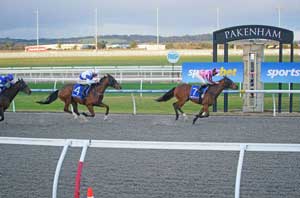
Weight in Horse Racing - 5 punting tips
- Jan 22, 2016 12:40 PM
One of the most discussed form factors in horse racing is the weight that a horse carries in a race.
- How much does weight influence the outcome of a race?
- How should punters assess the different weights that a horse carries from one race to another?
- What difference does set weights and weight-for-age conditions make on race assessments?
These and many more questions run through a punter's mind every time they study the form resulting in a plethora of formula's, rules-of-thumb and laws that punters have developed to simplify the challenge. We've combed through our research, including actual statistical models that we are developing for a new ratings formula that we will soon introduce to theGreatTipOff.com, to provide you with 5 Punting Tips when considering weight in a race.
#1 Horses have a weight carrying capacity
Scientists in the USA conducted intensive studies to measure the effects of various factors relating to horse racing in the 90's. One of those studies set-out to identify various relationships between the horse and the weight it carried (The Impact of Weight on Performance of a Race Horse - Larry Wellman Dec '99). One of the key findings coming out of this work was that horses do have a capacity to carry weight. The study found it relates to the horse's size and oxygen consumption level.
The physics is a little too heavy to get involved in when you are on the punt, but with this proven fact in mind, it does give punters an opportunity to better understand where the weight carrying limit might lie for a race horse and use that information when assessing it's chances in a race.
Identifying the weight carried for a runner's best performances is a useful first-step. Looking through recent runs and identifying the horse's highest carried weight in races where the horse has either won, placed or put in a strong run in higher grades is likely to give you an idea of a level where the horse has not reached it's weight capacity.
Looking at a series of races where higher weights were carried with noteable under-performance, is another way of identifying peak weight carrying capacity.
#2 Weight impacts a horse more over further distances
This is probably obvious to most punters, but how many times do you actually look at weight and distance together when assessing a horse's chances of winning a race? The same study that looked at the impact of weight on race horses, referred to above, proved that the longer a race lasts, the greater the impact that weight has on a race horse. With the significance of the impact increasing the longer the race goes.
The effect of 1kg of weight on a race horse over 1200m triples at a distance of 2600m.

Larry Wellman Dec '99
This evidence suggests that punters need to place greater emphasis on weight over longer distance races.
#3 Set Weights and Weight-For-Age
I am always surprised by how many punters don't look at set weights or weight-for-age races differently to Handicap races. The simple message here is that if the race is being weighted by the sex and age of the horse rather than it's class, there is likely to be some genuine advantage given to the class horses in the race particularly if they are in-form. Form expert Paul Joice makes this point in his article Why Punters Love Set Weights and Penalty Races. He goes on to provide evidence that the extent of the full advantage given to class horses in these races is rarely reflected in its odds giving punters a clear value opportunity.
#4 Weight, Class and Form
One of the most frequent questions I hear from punters is how to allow for weight, performance and race grade when assessing a horse's past performance. It's one of the biggest challenges that punters face. TheGreatTipOff.com team are currently working on a ratings system which aims to score each runners relative potential in a race with a particular focus on the relationship between these three factors. While there are other factors that can impact the outcome of a race, we are seeing a noticeable pattern between these three form indicators. We'll be reporting on it soon and then releasing it to our betting interface.
#5 Relative vs Absolute Weights
Absolute Weight is important when you consider a horse' capacity to handle weight but when you are trying to assess the impact of weight on performance, Relative Weight is a more useful measure. For example if a horse carried 56kg in a race and the lightest weight in the race was 52kg, absolute weight would be scored at 56 while relative weight is scored at 4 (i.e. 4 kg over the minimum weight). The thinking here is that a runner's result in a race is relative to all the other runners and therefore it's weight should be considered as such when rating a run.
We would welcome any thoughts or comments that you have on this article or your own experiences assessing weight on the punt. Please send them to [email protected].
Mike Steward








